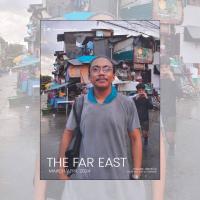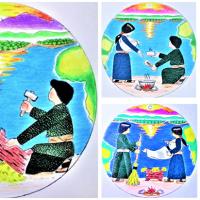
2021 Subanen Christmas Cards. Photo: Fr Vincent Busch SSC
The way of life of the Subanen tribal people of Mindanao in the southern Philippines has a long crafting tradition. They have developed clever ways of shaping rattan and bamboo, as well as using varieties of grass and palm leaves to make baskets, tools, furniture, mats, hats, roofs, walls, musical instruments and even the walls and roofs of their homes. I have worked with them over the past 20 years to form Subanen Crafts. Each year, we create Subanen Christmas cards with images celebrating the ordinary, thoughtful ways Joseph and Mary used in caring for each other.
Our design process began with listing the ordinary, thoughtful ways the people care for each other. We then selected skills Joseph and Mary may have utilised in the stable. My job is to create drawings of Mary and Joseph performing them.
These two illustrations show the before and after. First comes the sketch, then the hand-colouring and coloured paper inlay. Mary is holding Jesus securely in a Subanen-style sling, while Joseph repairs the manger. Subanens constantly have to repair their tools, belongings and homes, so it is natural that we would present Joseph using his carpentry skills.
Instead of a stable, I drew Mary and Joseph within an image of our planet – the temporary shelter of all God’s creatures. Above Mary and Joseph is the mountainous homeland of the Subanens, whose climate, forest, rivers and soil provide a safe and bountiful habitat. The Subanen people know that just as Joseph made the manger a safe place for Jesus, they need to make their habitat a safe and healthy place for their children.
This card shows Joseph giving Mary food. Subanens make nutritious soup from leaves, vegetables and root crops grown in their small garden plots. To cook, they need water and firewood, which are readily available in the forest and its healthy streams.
It calls to mind words from the Lord’s Prayer, “Give us this day our daily bread”. ‘Us’ and ‘our’ make it a prayer for the common good. How limited that prayer would be if it said, “Give me my daily bread.”
In the Philippines, economic policies designed to enhance progress and development proved hostile to the common good. They allowed extractive industries to make a quick profit at the long-term cost of polluting and degrading the sea, rivers, forests, air and farmland. From 1950 to 1990, logging companies stripped large areas. They made huge profits, allowing their owners, shareholders and a few workers to acquire the food that they prayerfully asked God to give them; while in the process causing permanent damage to the food-producing forest and soil.
But the damage went beyond the Subanen homeland, as without the forest cover, monsoon rains became torrents of muddy water cascading down the mountains, clogging irrigation systems and smothering coastal reefs and fisheries. In the aftermath, many Subanens left their homeland to seek work in cities and towns. In their small way, the Subanen artisans are working with the Columban Sisters to restore their God-given habitat, so that its ecosystems might continually provide a better life for all well into the future.
This card shows a thoughtful shepherd bringing kindling to Mary and Joseph. The background is a Subanen man carrying a huge bundle down a steep mountain trail.
He regularly hiked ten kilometres to the town so he could sell his burden for some odd coins to buy a few handfuls of rice. Subanen families support each other through such ordinary, but profound acts of love. This card honours one such act and helps us see the deep love that the Christ child will experience with his parents.
In another card, we show Joseph sweeping the stable while Mary spreads a blanket over the manger. It seems Joseph has stopped to look at Mary and Jesus. I imagine him experiencing the bond parents develop with their children. Mary and Joseph will feel
deeply the joy and suffering
of Jesus throughout their lives.
The bible points to this parent-child bond as an example of God’s enduring love for his people: “Can a woman forget the baby at her breast and have no compassion on the child of her womb? Though she may forget, I will not forget you” (Isaiah 49:15).
Jesus expands the embrace of God’s love to include all creation: “Go into all the world and preach the gospel to the whole creation” (Mark 16: 15). In our cards, the globe represents the whole of creation that God so loves.
This card shows Joseph pouring water into a basin while Mary places a bundle of fresh straw in the manger. For the Subanens, fetching water often involves a steep downhill hike to a forest-fed stream. The Subanens can easily imagine Joseph having to go some distance for water.
As deserts spread throughout our over-heated planet, thousands of people, mostly women, have to walk ever greater distances to get water. Jesus praises those who give drink to the thirsty (Matthew 25: 37–40), so it makes sense that he would praise people who, through their work and their way of life, enhance the ecosystems that provide the water.
As Joseph pours, he watches Mary preparing a safe and comfortable resting place for Jesus. While I was drawing Mary, I thought, what if Mary saved that handful of straw she was placing in the manger and somehow it was passed down to this day as a relic of the place where Jesus was born? Such a relic would be venerated in all our churches. No doubt, when Mary and Joseph fled Bethlehem to escape Herod’s soldiers, the straw remained as animal fodder and, once eaten, would have been recycled as dung to fertilise the soil. There it would have again become a nurturing resting place - this time as fertile soil for plants and trees.
In the vastness of the universe, planet Earth is but a tiny, fragile ‘stable’ for all God’s creatures. God so loved the world that he sent his Son to be born in that stable. In one of its wee corners, I have come to know many Subanens who are nurturing their life-giving habitat. Their Christmas cards celebrate the ordinary, yet profound ways in which they do this.
Columban Fr Vincent Busch has been a missionary in the Philippines since 1974. He currently works with the Subanen people of Mindanao, Philippines.
Listen to "Subanen Christmas in the world God loves"
Related links
- Read more from The Far East - September 2021
- Shop Subanen Christmas Cards


